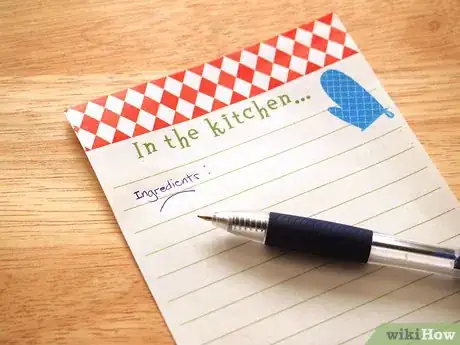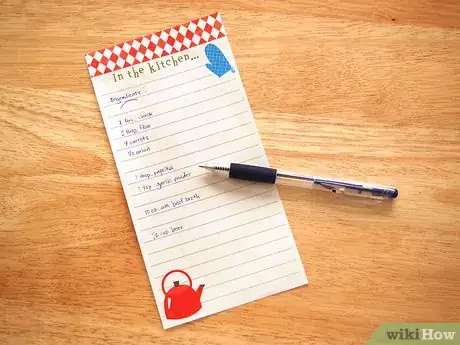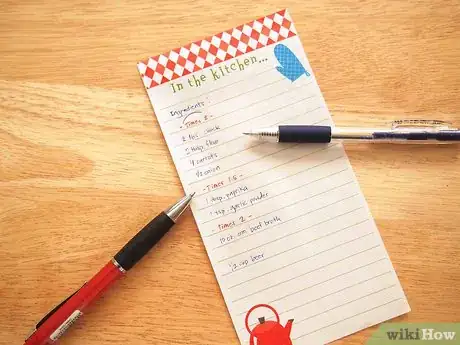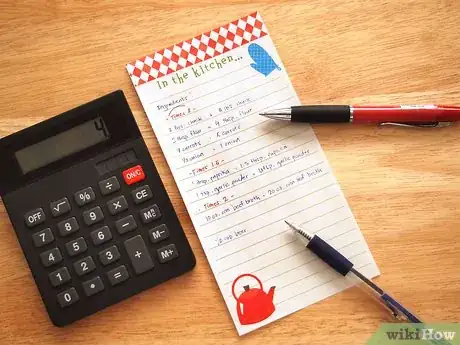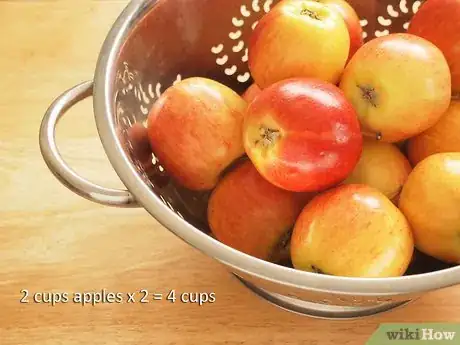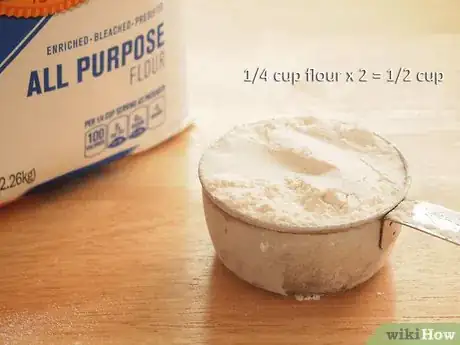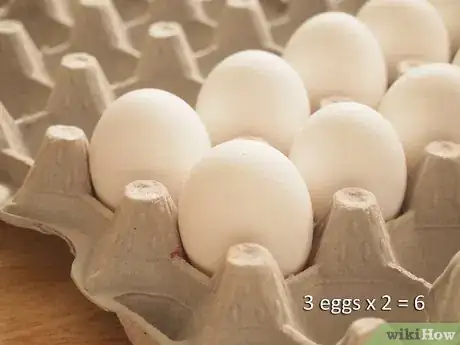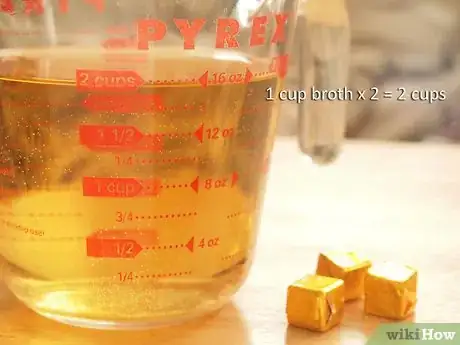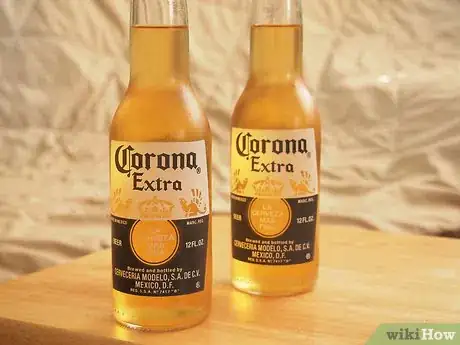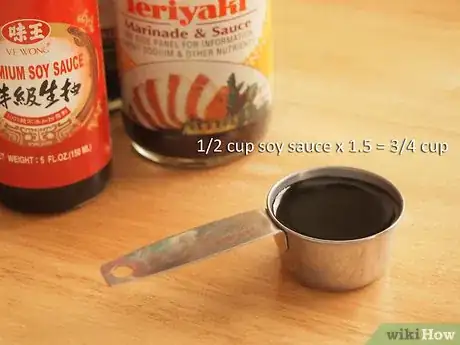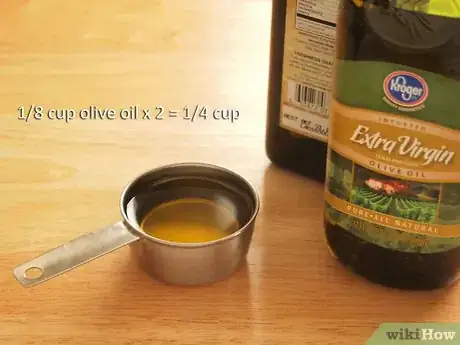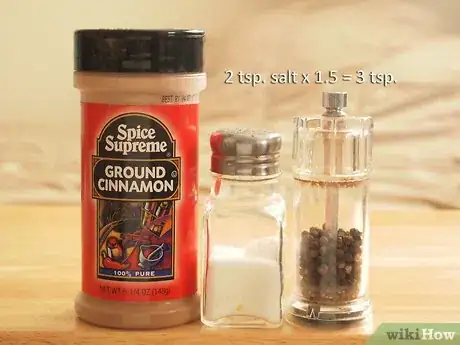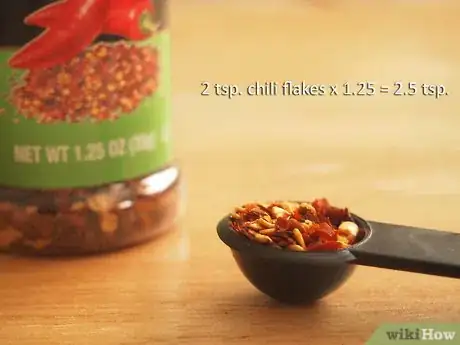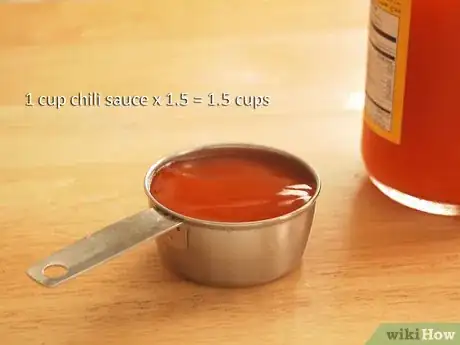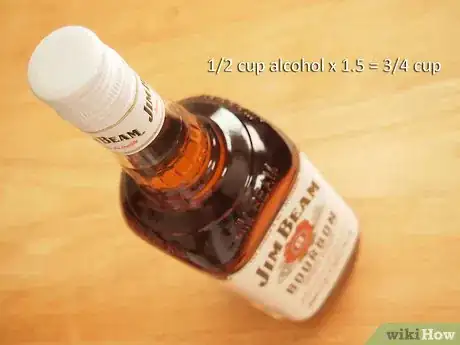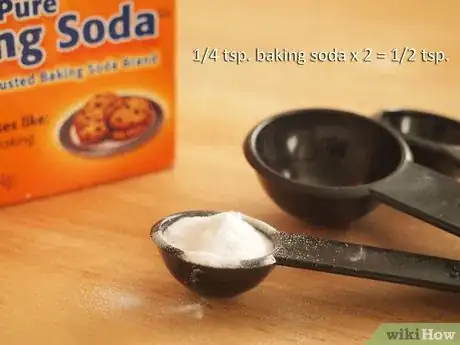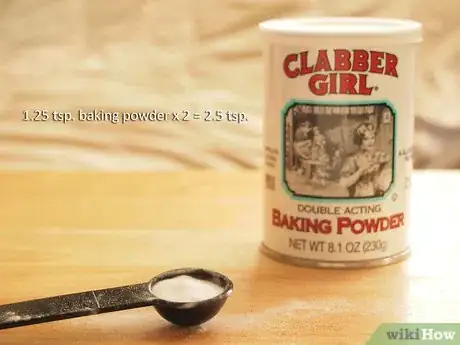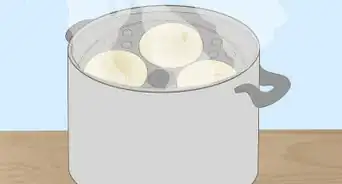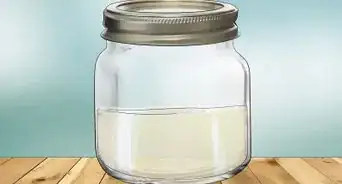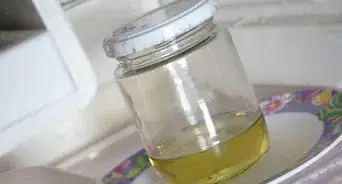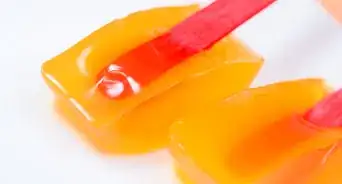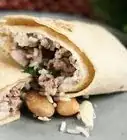wikiHow is a “wiki,” similar to Wikipedia, which means that many of our articles are co-written by multiple authors. To create this article, 10 people, some anonymous, worked to edit and improve it over time.
There are 8 references cited in this article, which can be found at the bottom of the page.
This article has been viewed 151,334 times.
Learn more...
It may seem like a simple task to double a recipe by multiplying all the ingredients by 2. Most cooks suggest batch cooking the original recipe or carefully adjusting seasonings, rising agents and alcohol to keep a flavor balance. In fact, when you learn how to double a recipe, you will need to use a few different ratios to make it taste just right.
Steps
Separating the Ingredients
-
1Write each of the ingredients on a piece of paper.[1] Chefs don’t recommend scaling a recipe in your head. You should write out the amounts you need ahead of time.
- If you have a copier, you may want to copy the original recipe and write in the margins, so that you have the instructions next to the ingredients.
-
2Write down all of the vegetables, flour and meat products in 1 column. Write down the seasonings in another column and the liquid ingredients in another column. Lastly, write down rising agents and alcohol in the last column.Advertisement
-
3Write “Times 2” above the main ingredients column and above the liquids column. Write “Times 1.5” above the seasonings” column, excluding hot peppers. Place them in the last column with the exacting ingredients, such as rising agents and alcohol.
-
4Finish the calculations below, then double check your ingredients list on the original recipe to make sure you’ve included everything. Rewrite your ingredients in list form according to the “double” measure you have calculated.
Doubling Main Ingredients
-
1Multiply the amount of all the vegetables and fruits by 2. This will provide the bulk of your recipe. Write down the new amount in your first column.
-
2Increase the flour in a recipe by 2. You will change your rising agent later on, according to the amount of flour you are using. Write down the new amount of flour you need.
-
3Double the amount of meat you must purchase.[2] Remember that cooking larger chunks of meat may require increased cooking time. Write down the new lb. or g measurement.
-
4Double the amount of eggs you will use exactly.[3]
Doubling Liquids
-
1Increase the amount of water you use by a multiple of 2.[4] Write this down in the liquids column. If you need 2 cups of water, you now need 4.
-
2Use twice as much stock.[5] Write this number down in the liquids column.
-
3Leave alcohol-based ingredients, such as sherry, wine, beer and spirits to the special ingredients section. Alcohol has a stronger flavor and will become too concentrated if doubled.
-
4Consider ingredients like soy sauce, Worcestershire sauce and other concentrated sauces to be seasonings. You will use a different ratio with these in order to get the measurements right.
-
5Double the amount of butter or olive oil that is called for in a recipe mix. However, don’t double the amount of olive oil or butter you use in the pan with sautéing. The aim should be to use enough to cover the pan you are using, so if you use a bigger pan, you use as much as you need to cover the pan.[6]
Increasing Seasonings
-
1Multiply your spices, like salt, pepper and cinnamon, by 1.5 times the original recipe.[7] If your recipe calls for 2 tsp. (12.2 g) of salt, you now need 3 tsp. (18.3 g) of salt. You may need to use a calculator to write down an accurate measurement.
-
2Increase chili peppers and other hot spices by 1.25 times the original recipe. This includes curry powders, garlic powders and fresh hot peppers.[8]
-
3Increase salty, peppery and concentrated sauces by 1.5 times the original amount. If a sauce has alcohol in it, you may want to only increase it by 1.25 times.
Increasing Special Ingredients (The Exceptions)
-
1Use 1.5 times the amount of alcohol in the recipe.[9] Try to avoid “eyeing it” and pouring based on instinct, if you are doubling the recipe for the first time.
-
2Recalculate your baking soda quantity. To rise properly, you need 1/4 tsp. (1.15 g) of baking soda per cup (125 g) of all-purpose flour. If you now need 4 cups (500 g) of all-purpose flour, your baking soda measurement should be 1 tsp. (4.6 g).
- Include extra baking soda, approximately 1/4 tsp. to 1/2 tsp. per cup of acidic ingredient. If your recipe calls for yogurt, buttermilk, vinegar or lemon juice, you will need slightly more baking soda to neutralize the acidity.
- If both baking powder and baking soda are in the recipe, it usually means there is an acidic ingredient that needs to be neutralized.
-
3Recalculate your baking powder quantity. To rise, you need 1.25 tsp. (4.44 g) of baking powder per cup (125 g) of all-purpose flour. If you have 4 cups of flour (500 g), you need 5 tsp. (17.77 g) of baking powder. [10]
Community Q&A
-
QuestionDo you double the baking time when you double a recipe?
 Community AnswerIf you double the time, it will most likely burn. A suggestion is to cook for the time the recipe suggests, then check it, and if it doesn't look done, cook it for another 5 minutes or so until fully cooked.
Community AnswerIf you double the time, it will most likely burn. A suggestion is to cook for the time the recipe suggests, then check it, and if it doesn't look done, cook it for another 5 minutes or so until fully cooked. -
QuestionIf there are no acidic ingredients in banana bread, why would I need to increase the baking soda and powder when doubling the recipe?
 Community AnswerInterestingly, bananas contain a large amount of potassium, which has been know to act as a cation in chemistry. Its ion would give off electrons. Thus when you add baking soda and powder, it actually works to minimize the ionization, which leads to a slightly acidic taste. Hydrogen will bond with potassium after losing two electrons and will result in a slightly acidic molecule. So when you increase the number for ions available, you must also increase the differential changes in the balancing elements.
Community AnswerInterestingly, bananas contain a large amount of potassium, which has been know to act as a cation in chemistry. Its ion would give off electrons. Thus when you add baking soda and powder, it actually works to minimize the ionization, which leads to a slightly acidic taste. Hydrogen will bond with potassium after losing two electrons and will result in a slightly acidic molecule. So when you increase the number for ions available, you must also increase the differential changes in the balancing elements. -
QuestionIf I want to double a recipe that calls for a 9" baking pan, what size pan should I use?
 Community AnswerThe formula for the area of a cylinder (which is the volume of the cake) is (r^2)πh. 9^2 * π = 254.469. then you double this and reverse this equation. (r^2)π = 508.938, then r = 12.728, so use a baking pan with 12.5" diameter, and add 5 - 10 minutes to the cooking time.
Community AnswerThe formula for the area of a cylinder (which is the volume of the cake) is (r^2)πh. 9^2 * π = 254.469. then you double this and reverse this equation. (r^2)π = 508.938, then r = 12.728, so use a baking pan with 12.5" diameter, and add 5 - 10 minutes to the cooking time.
Warnings
- Avoid doubling batches of canned goods. Products like jam and pickles use exact ingredients and cooking times to get the product to the right consistency and flavor. Cook in batches with the original recipe.[11]⧼thumbs_response⧽
Things You'll Need
- Pencil
- Paper
- Copy of recipe
- Calculator
- Fahrenheit to Celsius calculator
References
- ↑ https://www.thekitchn.com/8-things-you-need-to-know-before-doubling-a-cookie-recipe-226141
- ↑ https://civilizedcaveman.com/meal-plans/double-a-recipe/
- ↑ https://civilizedcaveman.com/meal-plans/double-a-recipe/
- ↑ https://civilizedcaveman.com/meal-plans/double-a-recipe/
- ↑ https://civilizedcaveman.com/meal-plans/double-a-recipe/
- ↑ http://www.myrecipes.com/how-to/cooking-questions/how-to-double-a-recipe-00420000013236/
- ↑ https://civilizedcaveman.com/meal-plans/double-a-recipe/
- ↑ http://www.myrecipes.com/how-to/cooking-questions/how-to-double-a-recipe-00420000013236/
- ↑ https://civilizedcaveman.com/meal-plans/double-a-recipe/
- ↑ http://www.thekitchn.com/make-it-double-best-tips-for-making-double-batches-of-muffins-cookies-breads-180249
- ↑ http://foodinjars.com/2011/01/canning-101-why-you-shouldnt-double-batches-of-jam/
- https://www.myrecipes.com/how-to/cooking-questions/how-to-double-baking-recipe
- https://s3.amazonaws.com/example1786789/How-to-DoubleHalf-a-Recipe.pdf
- https://www.arcticgardens.ca/en/tips-tricks/doubling-recipes/
About This Article
To double a recipe, you'll need to make a few adjustments to different ingredients to make it taste just right. Double all of the main ingredients in your recipe, like flour, eggs, vegetables, and meat. However, for seasonings, only use 1 and a half times the original amount so your dish doesn't wind up too salty, spicy, or sweet. If your recipe calls for baking soda, you should use ¼ teaspoon per every cup of flour. Similarly, if your recipe calls for baking powder, you should use 1 ¼ teaspoon for every cup of flour. Once you calculate the new measurements, rewrite the ingredient list with the proper proportions to avoid any confusion. To learn how to double a recipe that includes concentrated sauces, keep reading!
